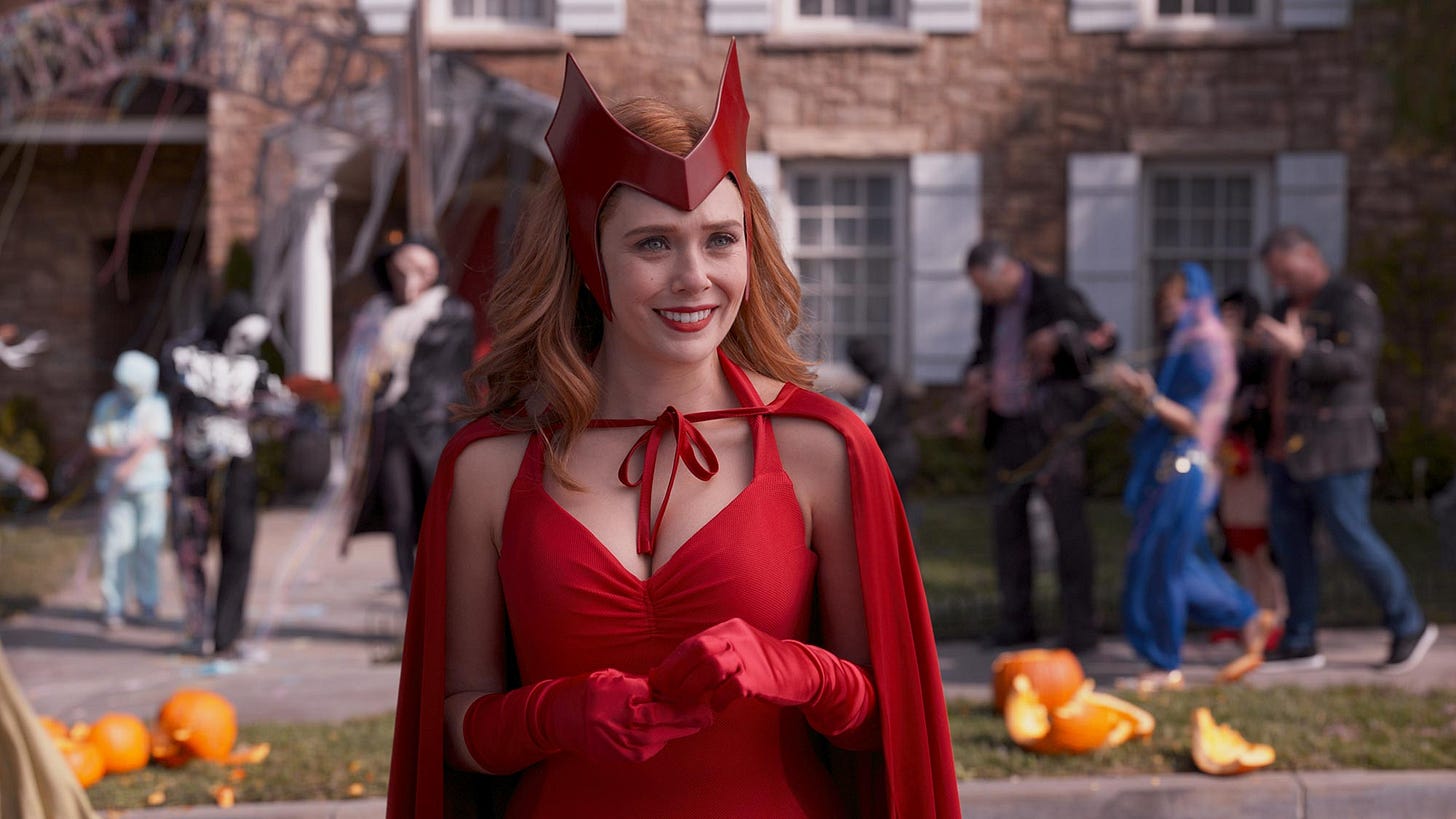Lessons in serialisation: why episodic storytelling rules
All the reasons why Monster of the Week episodes are better than Mythology episodes except when they aren't
This is the behind-the-scenes commentary for the serialised novella The Calibray Job.
“Singer/songwriter Joni Mitchell says that whatever she feels is the weak link in her last project gives her inspiration for the next.”
- Show Your Work, Austin Kleon
How often do you find yourself thinking about the way that a season of The X-Files is structured? If you’re me, the answer to that question is most days. I remember, as a kid, my brother was collecting the entirety of the series (excluding the then-unreleased tenth and eleventh seasons) as one of those magazine/DVD combo collections. That was when I first learned that the show was divided into two episode types; Monster of the Week and Mythology episodes.
For those who are unfamiliar, the Monster of the Week episodes are self-contained stories that see FBI agents Mulder and Scully going up against a different ‘monster’. One week they’re off hunting the Jersey Devil (“The Jersey Devil”) and the next they’re investigating a spooky doll (“Chinga”).
On the other hand, the Mythology episodes all form part of a long-form narrative that is woven around the Monster of the Week episodes. I pined after the mythology episodes as a kid. As Simon K. Jones noted in his post on the types of serialisation, “It felt like it was going somewhere.”

I wanted the answers. I was a child of the Lost generation where the ‘mystery box’ was the primary narrative drive of a lot of TV. So it’s interesting to me now as I embark on my first serialised storytelling project, that I find myself yearning for the Monster of the Week.
The problem with the eight-hour movie
Here’s the thing I think that Marvel has learned the hard way over the past two years. Good TV isn’t just a movie stretched thinly over multiple hours. You can’t just slice up a traditional three-act narrative and call it a ‘limited series’.
Take Moon Knight, for example. It very much feels, tonally, like an early doors MCU film. It’s an origin story in the vein of Iron Man or Thor. The problem is, that the origin story is now stretched over six hours instead of two. It’s not that Moon Knight is bad, it’s just that it feels a lot like it’s spinning its wheels while it waits for the next thing to happen. As Jones says, “Extend a movie to 8 hours without adjusting the narrative structure and it’s going to feel flabby and uneven. Rushed and languorous at the same time, somehow.”
Compare that to WandaVision, which very much leans on the episodic format - especially in its first half. Each episode has a contained story - Wanda and Vision are involved in a town talent show or they’re having the boss over for dinner - and the stakes and resolution are clear.
But, within that narrative structure, the creators laid the groundwork for the second half of the season. They leaned into the TV format to build out the narrative, telling a meta-textual story that comments on the sitcom format. The problem comes with the show abandoning that idea. The reason why the latter half of the season feels off, for me, is that it leans too much into the trappings of a Marvel movie and forgets that it’s a Marvel TV Show. However, even though I don’t think it quite sticks the landing, WandaVision had the right idea.
Cracking the code
The problem I still have with The X-Files is that I don’t think it quite figured out how to blend the mythology and Monster of the Week formats together. It was a revolutionary idea to tell an ongoing narrative the way that they did across nine seasons. But the structure feels more frustrating than liberating.
The Calibray Job, Episode Twelve
The Calibray Job is a sci-fi/horror serial. This is the twelfth episode: ‘Blood’. Previously: The crew of The Sol have arrived on Calibray to steal something from an abandoned science facility. Now, with their ship destroyed and one of the crew dead, they’ve finally made their way into the mysterious facility in the hopes of finding a way off this dying…
You’d get a juicy two-part Mythology episode that finally feels like it’s building to something only for Mulder and Scully to get whisked off to the arse-end of nowhere to take down a cryptid. Conversely, new viewers might be loving a streak of fantastic Monster of the Week episodes only to be hit with an impenetrable wall of mythology that requires a years-long buy-in you didn’t even know was required.
I think, for me, the first show I remember seeing that figured out the blend of long-form and episodic storytelling was the 2005 reboot of Doctor Who under Russell T. Davies. Every episode was a contained narrative, albeit with the occasional two-parter, but throughout the season there would be references to a larger story. Seeing the phrase ‘Bad Wolf’ graffitied across time, for example.
Star Trek: Strange New Worlds feels much the same, for me. Each episode is small-scale and contained but they each build towards something greater. Season one (spoilers), builds towards Pike’s acceptance of his future. Season two appears to be building towards something even grander.
Of course, I’m well aware that The X-Files walked so that Who and Strange New Worlds could run and I deeply love Mulder and Scully and all their quirks. But I do feel like these modern episodic shows have really cracked the code in telling a meaningful overall story that rewards investment while also feeling contained and friendly to new viewers.
Episodic freedom
So, why did I fall back in love with episodic TV? Aside from general fatigue with the ‘eight-hour movie’? The answer is freedom. I started watching Star Trek: Strange New Worlds and quickly realised the freedom the episodic format offered the creators.
As a viewer, I knew that I was getting something different each week within the established framework of the Star Trek universe. It’s classic Trek. Where older ‘big reset episodic’, as Jones calls them, shows had lost me was the lack of ongoing character and plot development. That’s what put me off the Monster of the Week episodes of The X-Files. As I’ve already alluded to, they felt like they were stalling the overall storytelling, holding up my search for answers.
What Strange New Worlds does so brilliantly is that it builds character arcs while also allowing for stories to wrap up within one episode. Each smaller story serves a wider narrative arc for the season. It feels like the perfect marriage of old and new. As Jones notes, “The writers have managed to find a way to bring back to the episodic aspects of the original shows while still embracing modern sensibilities.”
This is what I’ve learned writing The Calibray Job over the past few months. I’ve noticed a decline in engagement as the series has continued. I have many theories as to why this is, chief among which is the idea of ‘homework’. You see ‘episode eight’ and you’re already out of the loop, right?
You don’t have time to read the first seven episodes so you tap out. Only those who are there from day dot are still reading. Publishing The Calibray Job has been an incredibly rewarding experience for a number of reasons. Most importantly, I’ve had some wonderful interactions with people who have read (and hopefully enjoyed the story). I’ve also learned what I want to do as a creator.
I want the freedom to write different stories. I don’t want to be tied to one tone or one narrative for months at a time. That’s where the freedom of episodic storytelling comes in. Every episode of Strange New Worlds is designed to feel like a different movie. They built this framework - starship explores the universe with a diverse crew - and within that, they can tell any story they like. They can do a comedy (“Those Old Scientists”) or a horror movie (“All Those Who Wonder”) or even a musical (“Subspace Rapsody”) without sacrificing ongoing character arcs.
This is what I want from the next project in The Yesterday Saga. The Calibray Job has always been planned as a sort of ‘limited series’ with a clear ending. But the next thing will be different. Inspired by people like Simon K. Jones and his Tales from the Triverse, I want to create an episodic series that allows me to tell a range of stories all while exploring and expanding the universe of The Yesterday Saga and all those that live within its borders.
I mentioned in June that I was planning on launching a serial called ‘Ghosts of Tameria’. Well, that project is now going to be an episodic series under the working title of ‘The Yesterday Chronicles’ with ‘Ghosts of Tameria’ serving as the ‘pilot’ short story/episode in the series. Will I succeed in practising what I preach? That’s for you to decide, dear reader. I just hope you’ll join me on the journey.







This was fun to read! Totally agree with what you say about X-Files, and the way the two types of storytelling seemed to conflict.
For me, Babylon 5 is still the the main reference point for a blended form of storytelling - and that's from the same era as X-files. B5 has a strong 5-year arc, but each individual episode is highly self-contained, even when in the thick of the on-going plot. There are surprisingly few episodes that aren't approachable for a new viewer - hence I've bumped into numerous viewers who only started watching in seasons 3 or 4 (I started in 2).
The trick is having consistent character continuity, so that long-term viewers are always getting the feeling of progress, even if the episode plots are standalone thing-of-the-weeks. The most frustrating form of serialisation, I think, is when characters never evolve and remain in their original archetypes throughout.
I've found that removing chapter numbers and presenting Triverse as an anthology of connected short stories has really helped to bring in new readers: it's still a small thing, but there's definitely new people popping up in the likes and comments all the time. Occasionally I'll mark a new story as being a good jumping-on point (which I know worked for one subscriber, who then became a paid subscriber). Certainly feels like I haven't cracked the best way to do it yet, though.
Thanks for your insight here, I'm currently editing a book but I've become increasingly enamored with the capacity of Substack for another project. The episodic format therefore homework you mention is completely accurate. Which is some of the reason why I'm hesitant to commit just yet to starting something fictional and episodic here. But, the way Sarah Fay suggests is to make it so the entries can be read in any, or near enough any, order and this feels like it would work and remove the "homework" feeling. The thing is, the narrative, and the arc, but if each one is individual that will happen within each post I guess? Lots to ponder!